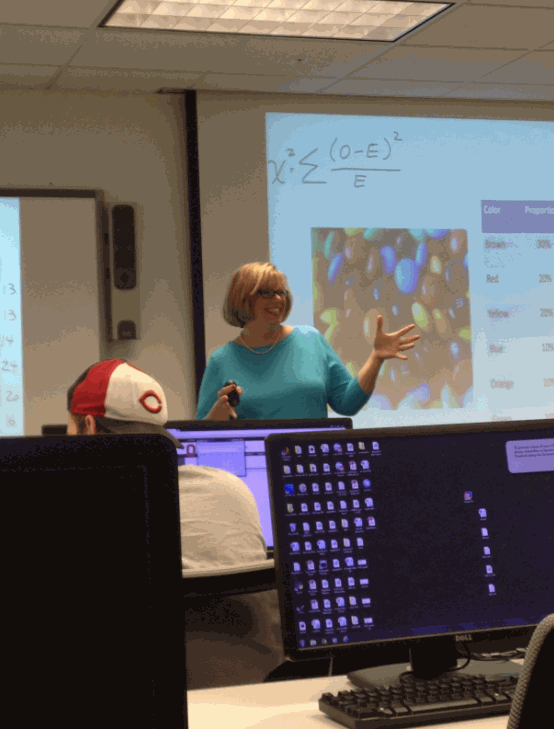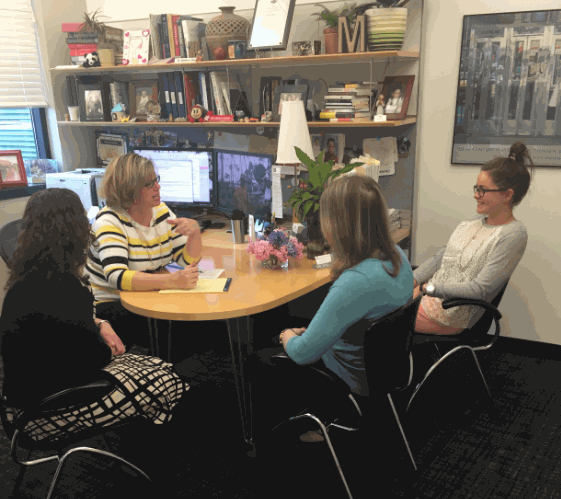 School name: The Ohio State University
School name: The Ohio State University
Type of college/university: Large, four-year, public research university
School locale: Columbus, Ohio (moderate sized city)
Classes you teach: Teaching of Psychology (graduate seminar/practicum), Social Psychology, Data Analysis/Quantitative methods.
I am also the Program Director for Introduction to Psychology (supervise 30 GTAs) and the Coordinator for Social Psychology. I supervise 12-20 undergraduate course assistants each term in Independent Study in the Teaching of Psychology
What’s the best advice about teaching you’ve ever received?
I don’t know if this is advice or feedback, but the one statement that has had the most impact on my teaching was from a student, almost 15 years ago. On the end-of-term survey one student wrote, “Just because we heard it once doesn’t mean we learned it!” This really hit home and made me think about how I structured my classes, which at the time were really mainly lecture-based. Since then I have increasingly focused on how students can apply and use the information covered in a course, not just listen to me talk about it or memorize it for a test.
Another piece of advice that has always stayed with me (and one I now give frequently, too) is to give students an outline. This advice was from Bob Arkin, faculty coordinator for the social psychology course here at OSU. An outline shows students the underlying structure of the material—how topics hang together, how they are nested, how they relate to one another. Plus, making an outline of your lecture helps you be more mindful of the organization and structure of your class.
What book or article has shaped your work as a psychology teacher?
In 2005, I read an article by Buskist, Benson, and Sikorski (2005) titled The Call to Teach. I was just transitioning back to academia from industry and the idea of teaching as a “calling” really resonated with me. As far as books, Doug Bernstein and Sandy Goss-Lucas’ Teaching Psychology: A Step-by-Step Guide (now in a second edition!) is a wonderful practical volume filled with all kinds of good advice that I wish I had known when I first started teaching. I still pull Don Forsyth’s Professor’s Guide to Teaching off my shelf from time to time too—great book.
 Tell us about your favorite lecture topic or course to teach.
Tell us about your favorite lecture topic or course to teach.
I absolutely love teaching statistics and data analysis. I spent about 15 years as a data analyst and research consultant, and I honestly can’t think of a more practically relevant topic, no matter what students will go on to do after graduation. The world needs people who understand data!
In the summer I teach a 12-week course on the Teaching of Psychology for graduate students. I lead a general seminar, then the GTAs split into separate practica led by senior TAs who have experience teaching a particular course. It’s a blend of general pedagogy and hands-on, practical course development to help new instructors be prepared and confident for their teaching assignments in the fall.
Describe a favorite in-class activity or assignment.
One of my favorite in-class activities is one I developed for social psychology based on personal experience at a company retreat. In one session employees were split by division and given a table piled with various supplies. We had to use the supplies to build a specific structure. Given what we had to work with, this seemed like an impossible task. Still, we were determined that the Research team needed to win (or rather, destroy the other teams). Let’s just say it became very competitive very quickly and involved some “covert operations.” At the end of the task, the organizer pointed out that we should have just pooled our resources and collaborated; what we needed to complete the task had been intentionally divided among the separate units. What a perfect example of intergroup bias—as a social psychologist I couldn’t believe that I fell for it!
After that experience I created a class activity that has never yet failed to produce similar results. At the start of class, I bring a stack of newspapers and some rolls of masking tape to class, and I tell the students we are going to do a group activity. I divide the class into 3-4 person “teams” and give each group a newspaper and tape. On the board I write this goal: Build the tallest, sturdiest tower possible using only the materials provided in the time given. The tower must be free-standing (not taped to ceiling or floor), but there are no other rules. Students get about 7 minutes to build a tower, and typically the “competition” really heats up. In all the years I’ve used this activity no one has ever collaborated or even shared supplies! As soon as they are assigned to a group, the competition kicks in. At the end when I ask, “why did you compete?” there is always a stunned silence as the realization sets in that they could have collaborated… it just never occurred to them.
Sometimes I manipulate the resources available to “enhance” the bias—one team might get extra paper, or another team might get an almost-empty roll of tape that runs out before they finish, giving us more to talk about when we debrief the activity. This sets up many issues covered in intergroup relations/stereotyping and prejudice -- the minimal group paradigm, realistic group conflict, ingroup favoritism, outgroup derogation, and more. It’s memorable, effective, and fun.
What teaching and learning techniques work best for you? (quizzes? homework? take home exams?
I strongly prefer anything that involves practical application of course material. For example, I love to assign a paper that asks students to “Be a Target of Persuasion” and reflect on the appeals used by someone trying to sell them something. I always assign a project in my stats course that asks students to apply their knowledge of statistical techniques to a question of interest to them. A student once analyzed whether his iPod really shuffled songs at random, and another collected data at her job to test whether the way she asked customers to join a loyalty program made a difference in whether they signed up. The final exam in my stats course this semester includes a take-home task. I’ll provide a large dataset (one of many available online; check out the Pew Research Center for example) and ask students to use the data to explore several specific questions as well as to develop some original hypotheses to test. I love the authenticity of that assignment and I wish we had done that in my stats class back in the day!
What’s your workspace like?
My office is tucked at the back of the Introduction to Psychology office, a large office space for the graduate instructors teaching Introduction to Psychology. I work closely with the graduate student coordinators for Intro Psych and Social Psych and I love talking with them about their ideas for the course. Nothing makes me happier than when someone stops by to chat about teaching. (The photo shows graduate teachers Jenn Belding, Kristie Harris, and Maggie Mehling.)
Three words that best describe your teaching style.
Engage, apply, assess
What is your teaching philosophy in 8 words or fewer?
Connect what students learn with what they do.
Tell us about a teaching disaster (or embarrassment) you’ve had.
Well, it wasn’t exactly teaching, but… once when I was giving a presentation to a large group of people I got a little carried away and walked towards the screen to gesture at a graph….and walked right off the back of the dais! Since then I prefer not to teach or present on a stage if at all possible.
What is something your students would be surprised to learn about you?
In grad school I did not enjoy teaching (I was terrible!) and I did not want to pursue a career in academia. After graduate school I worked in government, public relations, communications research, and later at a research consulting firm. As much as I enjoyed an applied setting, it didn’t take long for me to realize how little the general public knows about psychology. I actually found myself doing a lot of teaching—explaining psychology, statistics, and research methods to colleagues and clients. This motivated me to come back to college teaching as an adjunct, simply because I realized how important it is for people to understand what psychology is all about and how it’s relevant no matter what one’s occupation or field of study. Coming back to teach college students after gaining some real-world experience, I had a completely different attitude and perspective. I wanted students to understand the ideas and concepts in the courses I taught, but I also wanted students to see how they could use and apply the content in meaningful ways no matter what their majors or planned careers might be.
What are you currently reading for pleasure?
I love to read and am usually reading two or three books at a time. I tend to be pretty eclectic, but I particularly love biographies and non-fiction. I couldn’t put down Brain on Fire by Susannah Cahalan and The Distance Between Us by Reyna Grande. Right now I’m reading Anjelica Huston’s autobiography Watch Me, and I cannot wait for Harper Lee’s Go Set a Watchman to come out.
What tech tool could you not live without?
I really love my presenter because I have a hard time staying put behind a podium (see most embarrassing moment above). I am also a huge fan of Twitter--I thank Beth Morling @bmorling for her recommendation to sign up! (follow Missy at @mjbeers1)
What’s your hallway chatter like? What do you talk to colleagues about most (whether or not it is related to teaching/school)?
I love to talk about assessment and so it’s easy to strike up a conversation with me about that anytime, anywhere! Be warned!
I have an (almost) teenage son I adore more than anything, and I always enjoy talking with other parents about our kids. On holidays and days off school I love when kids drop by the office. You very well might see me holding one of my colleagues’ adorable babies when I get the chance.
PSYCHSESSIONS UPDATE: Listen to Missy discuss productive (and positive - like everything else Missy does!) assessment practices at her beloved The Ohio State University! https://psychsessionspodcast.libsyn.com/e015-melissa-beers-all-ohio-all-ohio-state-all-in-for-teacher-training
